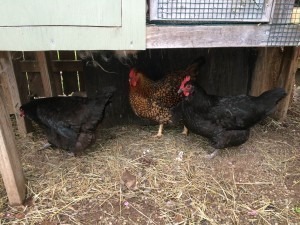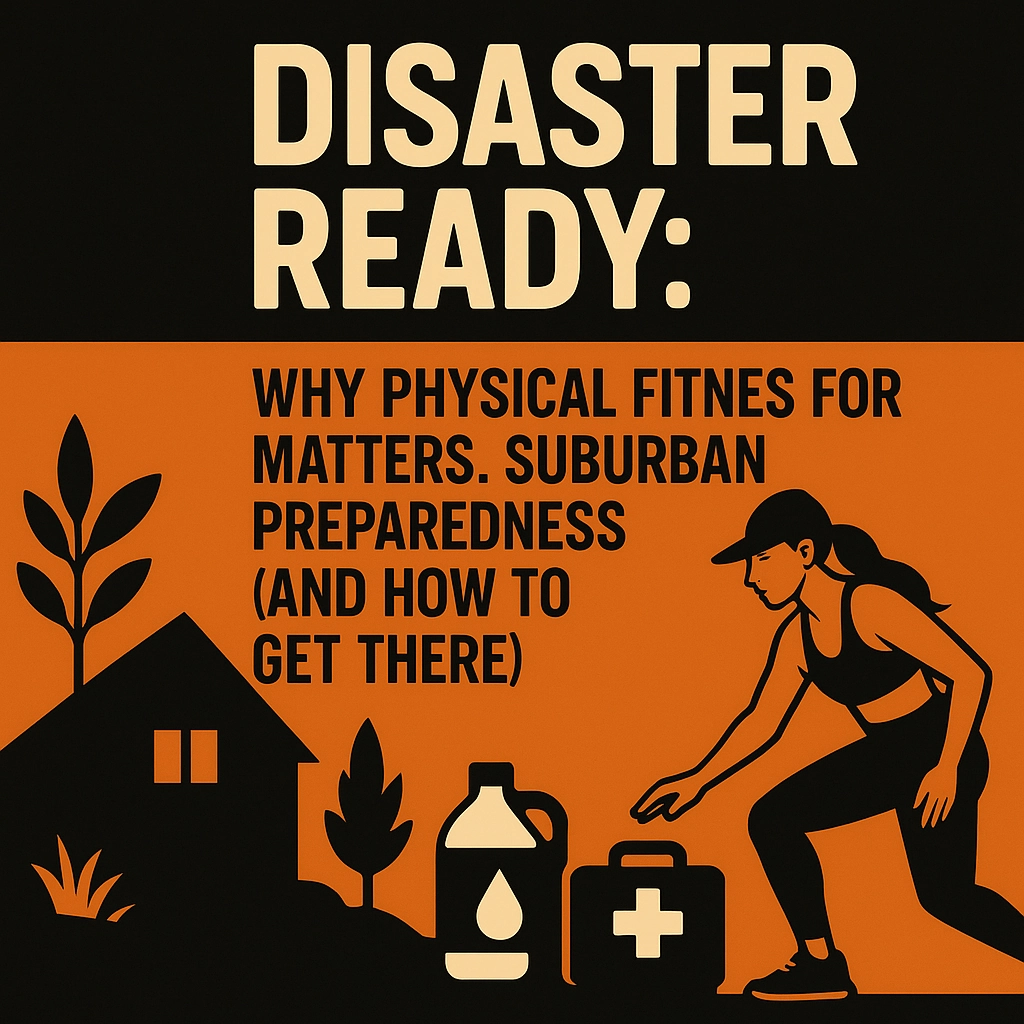This is the second part of a three part article sharing with you my experiences with square foot farming… its something most suburban dwellers can do and its an essential prepper skill. In part one, I explained some of my experiences with gardening in small spaces… in this part, I will share with you some of experiences with raising chickens for eggs. This writeup is not comprehensive about raising chickens… if nothing else, it can give you an idea where to start and let you know that yes, even you can do it.
I currently have three chickens… 2 Australorps and 1 Wyandotte. My daughter has been involved with 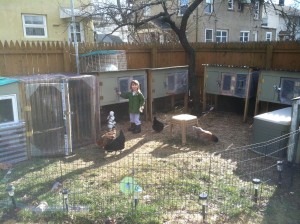 them since we brought them home and part of her chores are to take care of the animals… she’s still young so ultimately its my responsibility but its been a great way to get her involved in prepping. My small flock started at four but I lost an Americana to illness… which is a bummer because she laid green eggs. My coop is large enough to have 4 but to maintain harmony in the flock, I didn’t add another after I lost the americana. The birds I have were obtained from a farmer as poults several years ago. I asked for several different breeds that were decent egg producers and he gave me this mixed bag… but its clear the Australops are much better producers than the others Ive owned. At peak egg production, I get an egg per day per hen from Australops. My next flock will probably be a mix of Australops and Buff Orpingtons (just for some variety).
them since we brought them home and part of her chores are to take care of the animals… she’s still young so ultimately its my responsibility but its been a great way to get her involved in prepping. My small flock started at four but I lost an Americana to illness… which is a bummer because she laid green eggs. My coop is large enough to have 4 but to maintain harmony in the flock, I didn’t add another after I lost the americana. The birds I have were obtained from a farmer as poults several years ago. I asked for several different breeds that were decent egg producers and he gave me this mixed bag… but its clear the Australops are much better producers than the others Ive owned. At peak egg production, I get an egg per day per hen from Australops. My next flock will probably be a mix of Australops and Buff Orpingtons (just for some variety).
Chickens are very easy to keep and its actually protected by law in some places…. they are called “right to farm” laws. Several states leave laws or the interpretation of a very vague state law up to local municipalities so check with your local municipality or your county agricultural extension about livestock laws in your area; you may get an answer as simple as “no coop within 5 feet of a property line” or “laying hens but no roosters are allowed.” I checked with my municipality and found that there is no law excluding chickens, but there is a law against “livestock”… so my daughter named our chickens and they are pets, not livestock. Since we have only laying hens (no rooster means no serious noise issues) and I clean the coop regularly (so it stinks less), none of my neighbors have complained… but the occasional dozen brown eggs they get may help that cause too.
Caring for chickens isn’t time consuming or hard, but its an every day commitment. Check on them daily to ensure they have food and water… also, pick up any eggs they may have laid. Depending on the breed, each 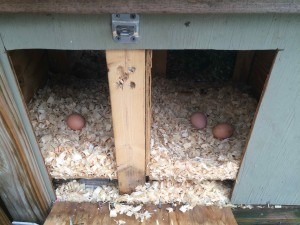 bird will lay, on average, an egg per day or every other day in the summer months… but as days get shorter, egg production will slow down. In the winter months, you can trick them into thinking its summer with artificial light set on a timer to give them an extra 4 or 5 hours of light per day. Used properly, lights can extend the laying season year round (without any serious adverse effect to the birds). In addition to daily checks, handle each bird weekly… if you have a small flock, its easy to remember the approximate weight of each bird and the look they have in their eyes and feathers while healthy. An illness could kill your entire flock so catching it early is important…and you may want to quarantine a sick bird. Monthly, clean their coop and replace the bedding…. it helps with bird health and keeps the yard from stinking. The wood shavings or straw people normally use for bedding can be purchased from local pet supply places or from tractor supply… but I use shredded paper. It functions the same and its free from my home office. Chicken manure is too rich to put directly in garden soil but it makes for great compost when mixed with leaves, dirt, etc. and allowed to rot.
bird will lay, on average, an egg per day or every other day in the summer months… but as days get shorter, egg production will slow down. In the winter months, you can trick them into thinking its summer with artificial light set on a timer to give them an extra 4 or 5 hours of light per day. Used properly, lights can extend the laying season year round (without any serious adverse effect to the birds). In addition to daily checks, handle each bird weekly… if you have a small flock, its easy to remember the approximate weight of each bird and the look they have in their eyes and feathers while healthy. An illness could kill your entire flock so catching it early is important…and you may want to quarantine a sick bird. Monthly, clean their coop and replace the bedding…. it helps with bird health and keeps the yard from stinking. The wood shavings or straw people normally use for bedding can be purchased from local pet supply places or from tractor supply… but I use shredded paper. It functions the same and its free from my home office. Chicken manure is too rich to put directly in garden soil but it makes for great compost when mixed with leaves, dirt, etc. and allowed to rot.
Housing them is really quite easy. I built a chicken coop for a just over $100 that includes a 4 foot by 8 foot run (which is fenced in and protected overhead from weather), an inside roosting area raised up off the 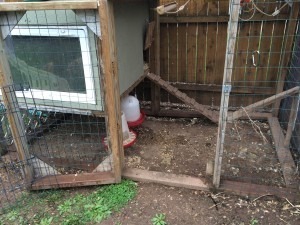 ground, and 2 nesting boxes… its a pretty good size for 4 chickens. The run area was picked clean of grass in no time and now they survive mostly off pellets, but they are released into the yard to scratch while I’m at home. But I warn you chickens are somewhat adventurous (or stupid) and on more than one occasion Ive had to retrieve them from a neighbors yard. Puppy fences work (to a degree since chickens can fly for short distances… click here to see what I mean) to keep chickens in a specific part of your yard…. a chicken tractor works better though. Look online for chicken tractor and coop ideas… with a large number of back yard chicken raisers, there is a wealth of information… find one that works for you.
ground, and 2 nesting boxes… its a pretty good size for 4 chickens. The run area was picked clean of grass in no time and now they survive mostly off pellets, but they are released into the yard to scratch while I’m at home. But I warn you chickens are somewhat adventurous (or stupid) and on more than one occasion Ive had to retrieve them from a neighbors yard. Puppy fences work (to a degree since chickens can fly for short distances… click here to see what I mean) to keep chickens in a specific part of your yard…. a chicken tractor works better though. Look online for chicken tractor and coop ideas… with a large number of back yard chicken raisers, there is a wealth of information… find one that works for you.
Feeding chickens is a snap… they have a very varied diet and rarely overeat so keeping a food supply for several days in a coop isn’t a problem. Because of my yard size and the proximity to my neighbors, my birds are kept in their coop most of the time which means they eat a lot of bagged food…and they are messy so 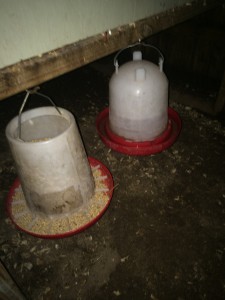 about a quarter of their pellets end up on the ground. Despite the “complete diet” that comes from a bag, I try to vary their diet as much as possible… scratching in the yard is great for that. When released into the yard, they will peck at grass and insects and they absolutely love worms and whatever grubs come up in my garden (free range chickens are fed this diet almost entirely). On winter days when I cant release them to scratch or when no scratch is available (due to snow cover), I feed them a small plate of sprouts. Alfalfa seems to get eaten fastest and always gets picked clean, but they will devour most any plate I put in the run with them.
about a quarter of their pellets end up on the ground. Despite the “complete diet” that comes from a bag, I try to vary their diet as much as possible… scratching in the yard is great for that. When released into the yard, they will peck at grass and insects and they absolutely love worms and whatever grubs come up in my garden (free range chickens are fed this diet almost entirely). On winter days when I cant release them to scratch or when no scratch is available (due to snow cover), I feed them a small plate of sprouts. Alfalfa seems to get eaten fastest and always gets picked clean, but they will devour most any plate I put in the run with them.
Don’t limit the amount of water your chickens have access too… and make sure you change it daily if it freezes… or even twice daily. I keep two waterers on hand in the winter… I put in a fresh one in the morning and another as soon as I get home from work, chances are the water has frozen within a few hours. I bought most of my waterers and feed troughs at tractor supply but below are links to a few items if you don’t have one nearby. Also, Ive included some links to books you will find of interest if you’re getting into chickens. While much of the information you will need can be found through open sources on the internet, these books (vet book and storeys chicken book) have most of what you will need and having a library of such books is a good idea as an animal grower. Feel free to ask questions in the comments and Ill do my best to answer them from my experiences.


